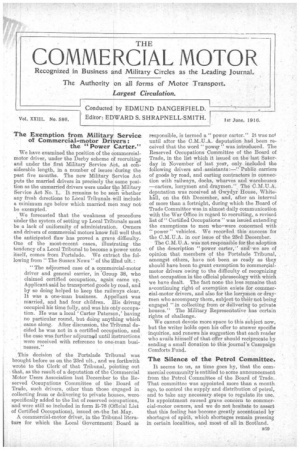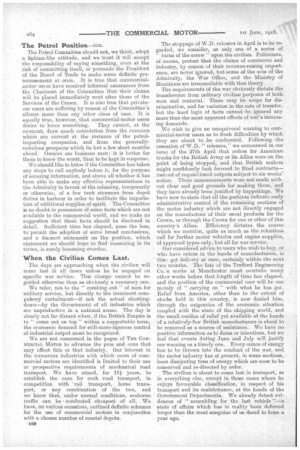The Exemption from Military Service of Commercial-motor Drtvers :
Page 1

Page 2

If you've noticed an error in this article please click here to report it so we can fix it.
the "Power Carter." We have examined the position of the commercial motor driver, under the Derby scheme of recruiting and under the first Military Service Act, at considerable length, in a number of issues during the past five months. The new Military Service Act puts the married drivers in precisely the same position as the unmarried drivers were under the Military Service Act No. 1. It remains to be seen whether any fresh directions to Local Tribunals will include a minimum age below which married men may not be exempted.
We forecasted that the weakness of procedure under the system of setting up Local Tribunals must be a lack of uniformity of administration. Owners and drivers of commercial motors know full well that the anticipated flaw has proved a grave difficulty. One of the most-recent cases, illustrating the tendency of a Local Tribunal to become a power unto itself, comes from Portslade. We extract the following from "The Sussex News " of the 22nd ult. : "The adjourned case of a commercial-motor driver and general carrier, in 'Group 38, who claimed certified occupation, again came up.
• Applicant said he transported goods by road, and • by so doing helped to keep the railways clear. It was a one-man business. Appellant was married, and had four children. His driving • occupied his time fully, and was his only occupation. He was a local 'Carter Paterson,' having no particular round, but doing anything which came along. After discussion, the Tribunal decided he was not in a certified occupation, and the case was further adjourna.d until instructions were received with reference to one-man businesses."
, This decision of the Portslade Tribunal was brought before us on the 23rd ult., and we forthwith wrote to the Clerk of that Tribunal, pointing out that, as the result of a deputation of the Commercial Motor Users Association last December to the Reserved Occupations Committee of the Board of Trade, such drivers, other than. those engaged in collecting from or delivering to private houses, were specifically added to the list of reserved occupations, and were still so included in form R-78 (Official List of Certified Occupations), issued on,the 1st May.
A commercial-motor driver, in the Tribunal literature for which the Local Government Board is responsible, is termed a "power carter." It was noi until after the C.1VI.U.A. deputation had been received that the word " power " was introduced. The Reserved Occupations Committee of the Board of Trade, in the list which it issued on the last Saturday in November of last yeal, only included the following drivers and -assistants :—" Public carriers of godds by road, and carting contractors in connection with railways, docks, wharves and warehouses —carters, lorrymen and draymen." The C.M.U.A. deputation was received at Gwydyr House, Whitehall, on the 6th December, and, after an interval of more than a fortnight, during which the Board of Trade Committee was in almost daily communication with the War Office in regard to recruiting, a revised list of" Certified Occupations " was issued extending the exemptions to men who-were concerned with " power" vehicles. We recorded this success for the C.M.I.T.A. in our issue of the 23rd December.
The C.M.U.A. wiis not responsible for the adoption of the description " power carter," andwe are of opinion that members of the Portslade Tribunal, amongst others, have not been as ready as they should have been to,grant exemption to commercialmotor drivers owing to the difficulty of recognizing that occupation in the official phraseology with which we have dealt. The fact none the less remains that atcontinuing right of exemption exists for commercial-motor drivers, and also for the lorrymen or draymen who accompany them, subject to their not being engaged "in collecting from or delivering to private houses." The Military Representative has certain rights of challenge.
We cannot devote more space to this subject now, but the writer holds open his offer to answer specific inquiries, and renews his suggestion that each reader who avails himself of that offer should reciprocate by sending a small donation to this journal's Campaign Comforts Fund.
The Silence of the Petrol Committee.
It seems to us, as time goes by, that the commercial community is entitled to some announcement from the Petrol Committee of the Board of Trade. That committee was appointed more than a month ago, to control the supply and distribution of petrol, and to take any necessary steps to regulate its use. Its appointment caused grave concern to commercial-motor owners, and we do not hesitate to assert that this feeling has become greatly accentuated by shortage S of spirit, which shortages remain pressing in certain localities, and most of all in Scotland. The Petrol Committee should not, we think, adopt a Sphinx-like attitude, and we trust it will accept. the responsibility of saying something, even at the risk of committing itself, or persuade the President of the Board of Trade to make some definite pronouncement at once. It is true that commercialmotor uscrs have received informal assurances from the Chairman of the Committee that their claims will be Placed immediately next after those of the Services of the Crown. It is also true that privatecar users are suffering by reason of the Committee's silence more than any -other class. of user. It is equally true, however, that commercial-motor users desire to know something. They cannot, at the moment, draw much consolation from the rumours which are current at the instance of the petrolimporting companies, and from the generallynebulous prospects which lie but a few short months ahead. Owners are business men: it is better for them to know the worst, than to be kept in suspense.
We should like to know if the Cominittee has taken any steps to call anybody before it, for the purpose of securing information, and above all whether it has been able to make any effective representations to the Admiralty in favour of the releasing, temporarily or otherwise, of a few tank steamers from depot duties in harbour in order to facilitate the importation of additional supPlies of spirit. The Committee is no doubt in possession Of some facts which are not available to the commercial world, and we make no suggestion that thee facts should be disclosed in detail. Sufficient time has elapsed, none the less, to permit the adoption of some broad conclusions, and a discreet statement on the position, which statement we should hope to find reassuring in its terms, is surely becoming overdue.
When the Civilian Comes Last.
The days are approaching when the civilian will come last in all dazes unless he be engaged on specific war seivice. This change cannot be regarded otherwise than as obviously a necessary one.
We refer, not to the " combing out " of men for military service, but directly to the imminent compulsory curtailment—if not the actual shuttingdown—by the Government of all industries which are unproductive in a national sense. The day is clearly not far distant when, if the British Empire is. to " come out on top" within a supportable term, the economic demand for still-more-rigorous control of industrial output must be recognized.
We are not concerned in the pages of THE COMMERCIAL MOTOR to advance the pros and cons that may affect this or that industry. Our interest in the numerous industries with which users of commercial motors are identified is limited to their use or prospective requirements of mechanical road transport. We have aimed, for 11+ years, to establish the case for such road transport, in competition with 'rail transport, horse transport, or any combination of the two, and. we know that, under normal conditions, seaborne traffic can be , conducted cheapest of all. We have, on various occasions, outlined definite schemes for the use of commercial motors. in conjunction with a chosen number of coastal depots. The stoppage of W.D. releases in April is to be regarded, we consider, as only one of a series of " turns of the screw " upon the civilian. Politicians, of course, protest that the claims of commerce and industry, by reason of their revenue-raising importance, are never ignored, but some of the acts of the Admiralty, the War Office, and the Ministry of Munitions are irreconcilable with that theory.
The requirements of the war obviously dictate the transference from ordinary civilian 'purposes of both men and material: There may be scope for discrimination, and for variation in the rate of transfer, but the hard logic of faets cannot be ignored any more than the most apparent effects of war's increasing demands.
We wish to give an unequivocal warning to commercial-motor users as to fresh difficulties by whichthey are about to ,be confronted. Following , the cessation of 'W.D. " releases," we announced in. our issue of the 27th April that orders for American trucks for the British Army or its Allies were on the point of being stopped, and that British makers might confidently look forward to fixed contractsinetead of requisitioned outputs subject to six weeks' notice. Those announcements were not made without clear and' good grounds for making them, and they have already been justified by happenings. We have now to state that all the portents indicate early administrative control of the remaining sections of the motor industry which are not directly engaged on the manufacture of their usual products for the Crown, or through the Crown for one or other of this country's Allied. Efficiency dictates the course which we mention, quite as much as the relentless call for further motor vehicles and engine supplies, of approved types only, but all for war service. Our considered advice to users who wish to buy, or who have orders in the hands of manufacturers, is this : get delivery at once, certainly within the next two months. The fate of the Trafford Engineering Co.'s works at Manchester must overtake many other works before that length of time has elapsed, and the position of the commercial user will be one merely of " carrying on " with what he has got. Relief from America, other than to the extent of stoc .st held in this country, is now denied him, through the exigencies of the economic situation coupled with the state of the shipping world, and the small residue of relief yet available at the hands of a relatively-few British manufacturers is about to be removed as a. source of assistance. We have no positive information as. to dates or intentions, but we feel that events during June and July will justify our warning as a timely one. Every ounce of energy has to be thrown into the conduct of the war, and the motor industry has at present, in some sections', been dissipating tons of energy which are soon to be conserved and re-directed by order.
The civilian is about to come last in transport, as in everything else, except in those cases where he enjoys favourable classification, in respect of his, transport and its maintenance, at the hands of the Government Departments. We already detect evidences of " scrambling for the last vehicle "—a state of affairs which• has in reality been deferred longer than the most sanguine of us dared to hope a year ago.




















